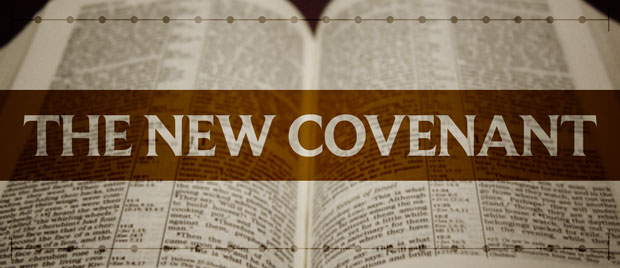On April 16, 2015 a commenter asked:
Jack Frost, on beliefs of the Church: Can you explain to me why the Bible includes the Old Testament at all?
Frost responded:
The Old Testament is included to provide context. Remember, according to the usual interpretation Jesus is supposed to be the Messiah foretold by the Jewish prophets.
Also, his message of love and universal brotherhood (i.e., anti-racism) is revolutionary precisely because it is a New Covenant that replaces the old one described at length in the Old Testament. To accept the New Covenant message is to deny the importance of race, and even family. All are one in Jesus (see Galatians 3:28).

4 replies on “The New Covenant”
Hello César and readers!
Its important to read the OT and NT every once in a while.
Most people never read them, but these are highly influential documents.
Some benefits of reading the whole Bible are …
A) a deeper awareness of Christian Hypocrisy and human Hypocrisy in general (most christians do not read the Bible, many or most have never read the whole book; but christians still force their children into christianity, give them christian names etc.);
B) a better grasp of christian history and thus European history, philosophy, law, including the religious wars like the Thirty Years War, the French Revolution etc. and the history of the Americas after Columbus;
C) a deeper understanding of jewish values, behaviour and tactics;
D) knowledge of the biblical mythology helps to understand many symbols in European art (paintings, music, literature);
E) overcoming psychological complexes (shadows) associated with christianity –> if we read the bible, this book becomes “smaller”; it looses its power (which it has over many people) and we lose the fear to confront these demons (this is also true for constitutions and other foundational texts);
F) a basic knowledge of the bible is beneficial for a more complete grasp of Nietzsche, W. L. Pierce, Kevin MacDonald etc. ;
G) extraction of knowledge (from the OT; f.e. the Book of Proverbs);
H) a better understanding of our contemporary situation (by knowing one more variable of this equation).
I write this, because I had to accept the importance of going to the original sources, after I avoided reading original sources due to a subconscious fear to discover unpleasant things in and through these documents.
Sure, we cannot read the foundational texts of all religions and philosophies.
But a few of them are exceptionally important, like the few basic texts of the four or five most influential religions and selected foundational texts of the most influential ideologies; provided, that these texts are not too longwinded and wordy (thank you very much for your advice in this matter, César!).
Besides the Bible, there are other basic books which can be beneficial in giving us a deeper understanding of our history (and future):
1) The constitution of your respective country (interesting in constitutions is not only their text, but also that which is not written in them)
2) the Koran (and Hadith) (interesting here are the similarities and differences to the OT and the NT)
3) the Analects of Confucius (apparently one of the most influential texts in east asian history)
4) the UN charter (esp. Article 53)
5) On Genetic Interests (by Frank Kemp Salter)
6) Industrial Society and Its Future (Ted. K.)
7) The Art of War (Sun Tzu)
Some of these texts can be found freely on the internet.
Best Wishes
Anonymous
Mr. Tort :
Do you think the White Race would be better off now if there had been no Protestant Reformation? Or, do you think the Reformation was beneficial to the White Race?
Not beneficial at all. This is Nietzsche:Here it becomes necessary to call up a memory that must be a hundred times more painful to Germans. The Germans have destroyed for Europe the last great harvest of civilization that Europe was ever to reap—the Renaissance. Is it understood at last, will it ever be understood, what the Renaissance was? The transvaluation of Christian values: an attempt with all available means, all instincts and all the resources of genius to bring about a triumph of the opposite values, the more noble values…
To attack at the critical place, at the very seat of Christianity, and there enthrone the more noble values—that is to say, to insinuate them into the instincts, into the most fundamental needs and appetites of those sitting there… I see before me the possibility of a perfectly heavenly enchantment and spectacle: it seems to me to scintillate with all the vibrations of a fine and delicate beauty, and within it there is an art so divine, so infernally divine, that one might search in vain for thousands of years for another such possibility; I see a spectacle so rich in significance and at the same time so wonderfully full of paradox that it should arouse all the gods on Olympus to immortal laughter: Cæsar Borgia as pope!… Am I understood?… Well then, that would have been the sort of triumph that I alone am longing for today: by it Christianity would have been swept away!
What happened? A German monk, Luther, came to Rome. This monk, with all the vengeful instincts of an unsuccessful priest in him, raised a rebellion against the Renaissance in Rome… Instead of grasping, with profound thanksgiving, the miracle that had taken place: the conquest of Christianity at its capital—instead of this, his hatred was stimulated by the spectacle. A religious man thinks only of himself. Luther saw only the depravity of the papacy at the very moment when the opposite was becoming apparent: the old corruption, the peccatum originale, Christianity itself, no longer occupied the papal chair! Instead there was life! Instead there was the triumph of life! Instead there was a great yea to all lofty, beautiful and daring things!… And Luther restored the church.
[…] The New Covenant (chechar.wordpress.com) […]